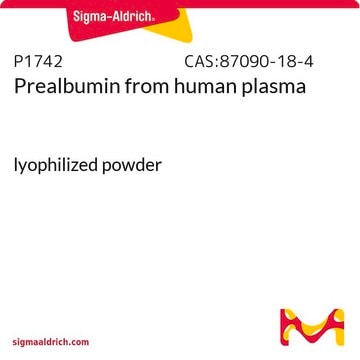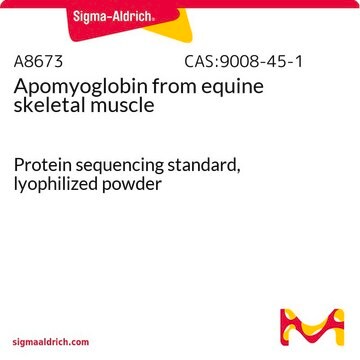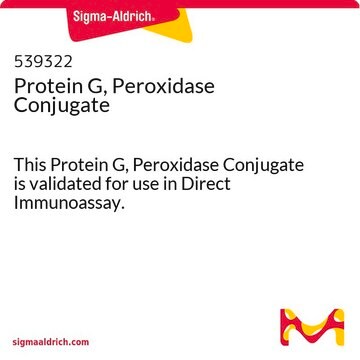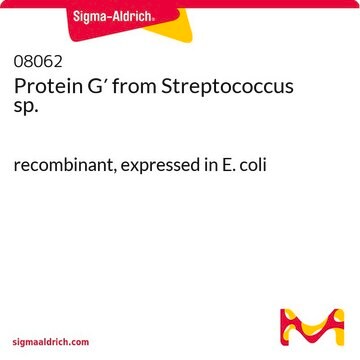529577
Prealbumin, Human Plasma
Synonym(s):
Prealbumin, Human Plasma, Transthyretin, Thyroxine-binding Prealbumin
Sign Into View Organizational & Contract Pricing
All Photos(1)
About This Item
Recommended Products
Assay
>95% (SDS-PAGE)
Quality Level
form
lyophilized
manufacturer/tradename
Calbiochem®
storage condition
OK to freeze
solubility
physiological buffer: soluble
shipped in
ambient
storage temp.
−20°C
General description
Native prealbumin from human plasma. Plasma protein with minimal carbohydrate. Found in plasma at about 30 mg/100 ml. Functions in the transport of retinol-binding protein, thyroxine, and vitamin A.
Native prealbumin from human plasma. Plasma protein with minimal carbohydrate. Found in plasma at about 300 mg/100 ml. Functions in the transport of retinol-binding protein, thyroxine and vitamin A.
Warning
Toxicity: Standard Handling (A)
Physical form
Lyophilized from 150 mM NaCl, 50 mM sodium phosphate buffer, pH 7.5.
Preparation Note
Prepared from plasma that has been shown by certified tests to be negative for HBsAg and for antibodies to HIV and HCV.
Reconstitution
Following reconstitution, aliquot and freeze (-20°C) for long-term storage or refrigerate (4°C) for short-term storage. Stock solutions are stable for up to 2 weeks at 4°C or for up to 6 months at -20°C.
Please refer to vial label for lot-specific reconstitution volume.
Other Notes
Blaney, J.M., et al. 1982. J. Am. Chem. Soc.104, 6424.
Legal Information
CALBIOCHEM is a registered trademark of Merck KGaA, Darmstadt, Germany
Storage Class Code
11 - Combustible Solids
WGK
WGK 1
Flash Point(F)
Not applicable
Flash Point(C)
Not applicable
Certificates of Analysis (COA)
Search for Certificates of Analysis (COA) by entering the products Lot/Batch Number. Lot and Batch Numbers can be found on a product’s label following the words ‘Lot’ or ‘Batch’.
Already Own This Product?
Find documentation for the products that you have recently purchased in the Document Library.
Lidia Ciccone et al.
Nutrients, 15(3) (2023-02-12)
Eicosapentaenoic acid (EPA; 20:5) and docosahexaenoic acid (DHA; 22:6), two omega-3 poly-unsaturated fatty acids (PUFAs), are the main components in oil derived from fish and other marine organisms. EPA and DHA are commercially available as dietary supplements and are considered
Christopher L Cioffi et al.
Journal of medicinal chemistry, 64(13), 9010-9041 (2021-06-18)
Dissociation of transthyretin (TTR) tetramers may lead to misfolding and aggregation of proamyloidogenic monomers, which underlies TTR amyloidosis (ATTR) pathophysiology. ATTR is a progressive disease resulting from the deposition of toxic fibrils in tissues that predominantly presents clinically as amyloid
Christopher L Cioffi et al.
Journal of medicinal chemistry, 63(19), 11054-11084 (2020-09-04)
Accumulation of cytotoxic lipofuscin bisretinoids may contribute to atrophic age-related macular degeneration (AMD) pathogenesis. Retinal bisretinoid synthesis depends on the influx of serum all-trans-retinol (1) delivered via a tertiary retinol binding protein 4 (RBP4)-transthyretin (TTR)-retinol complex. We previously identified selective
Xiao-Min Ren et al.
Environmental health perspectives, 128(10), 107008-107008 (2020-10-24)
Tetrabromobisphenol A (TBBPA) mono-ether structural analogs, identified as the by-products or transformation products of commercial TBBPA bis-ether derivatives, have been identified as emerging widespread pollutants. However, there is very little information regarding their toxicological effects. We aimed to explore the
Our team of scientists has experience in all areas of research including Life Science, Material Science, Chemical Synthesis, Chromatography, Analytical and many others.
Contact Technical Service








